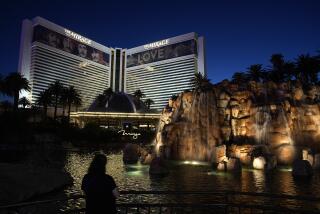The grim warning for the gambling industry in Atlantic Cityâs implosion
The news from the casino industry in Atlantic City, N.J., has been implacably, relentlessly horrific.
Over the weekend the owners of Trump Plaza, formerly a signature property on the boardwalk, said they expected it to close in September; the resortâs founder and namesake, Donald Trump, couldnât run from the wreckage fast enough: âI got out seven years ago; my timing was tremendous,â he said, or bragged, or whatever it is he does when his lips are moving. (Trump still owned 9.8% of the ownership company as of February 2013, according to public filings.)
Meanwhile, the Revel Casino, a $2.4-billion tower that was supposed to herald yet another rebirth of Atlantic City when it opened in 2012, has filed for bankruptcy for the second time in just over a year, and also may close. That will throw 3,140 workers out of work, adding to a toll that has driven the cityâs unemployment rate above 10%. In total, 7,000 casino workers, or 25% of the Atlantic City casino workforce, could be losing their jobs in the next couple of months.
Once the symbol of expectations that gambling could revitalize a moribund municipal economy, Atlantic City has become a symbol of how inflated expectations can produce a black hole -- the cityâs own budget was $10 million in the red last year, and things are looking worse for 2014.
New Jerseyâs casino take has been declining steadily since 2007; the casinosâ combined revenue last year of less than $2.9 billion was about what they recorded in 1989 -- not counting inflation. Add the effects of inflation and they barely matched what they earned in 1981, when A.C. gambling was new and there were only nine casinos compared to the current 12.
At this rate, all that will soon be left to remind people of the hopes and dreams that gambling once brought to this community may be âAtlantic City,â Luis Malleâs brilliantly corrosive 1980 movie, filmed on location just as the first high-rise demolitions were clearing away the blight to make way for the gleaming future.
Since Atlantic City never invested its casino windfall in seriously improving its citizensâ lives, the residents may justifiably ask what they got for turning the place, temporarily, into a gambling center.
âBusinesses that existed for many years were run out of town,â wrote Warren Massey, the cityâs former housing authority chairman, in the local newspaper. âThose at the forefront of this debacle should be exposed for their greed, incompetence and neglect. They neglected to do whatâs right for Atlantic City and the thousands of employees who have lost their livelihood due to the callous nature of this insidious business.â
Gambling resorts elsewhere that think they can escape what has happened to Atlantic City should take care: It can happen to them, too. one problem is the economic slump, but the main problem is competition. In Atlantic Cityâs case, the competition comes from Indian casinos and other venues in the Northeast, especially Pennsylvania. A.C. is a drive-to destination, which makes it especially vulnerable to erosion by casinos located closer to its customers.
âIf you can play the same slots at home without driving a couple of hours, youâll do it,â says David G. Schwartz, director of the Center for Gaming Research at the University of Nevada, Las Vegas.
Las Vegas hasnât quite suffered to the same degree, despite the growth of Indian gaming in California, which is its prime market. Schwartz points to a couple of reasons for that. The Vegas strip is still an air-travel destination, so it still draws from markets unaffected by new casinos in local communities.
The Strip has done a good job of building up its non-gambling appeal by offering nightlife, shows and high-grade hotel and dining experiences. Even a big Indian casino canât offer the buzz of Vegas on a prize-fight weekend. The share of Strip revenue provided by the gambling floor dropped to 37% last year from 46% in 2000; most of the slack has been taken up by rooms, food and beverage.
But the Vegas Strip still has its problems, too. The Stripâs gambling revenue of $6.5 billion last year was the highest in dollar terms since 2007, just before the economic slump. But when accounting for inflation, itâs about where it was in 2000.
Reno and Tahoe are the Nevada venues that have really taken a hit from Indian competition. Unlike Vegas, theyâre driving destinations, mostly for the San Francisco market -- and you canât drive too far from San Francisco without running into an Indian casino on the California side of the line. Renoâs dependence on gambling revenue has barely budged since 2000; and since those have fallen more than 25% since 2007, that spells trouble.
The most important lesson delivered by Atlantic City is that the casino market is finite. The Peak Gambling point has surely been reached in some regions of the U.S., if not in the nation as a whole. The idea that casinos are a panacea for municipal decline was never very sound to begin with, and now it looks worse than ever.
Itâs hard to see where future growth will come from. UNLVâs Schwartz says there may be some potential in new gambling jurisdictions around the country, but in truth, the big markets, such as California and the Northeast, have been picked clean. Schwartz says Las Vegas will need to tap international markets aggressively. But Vegas will face lots of competition there, too.
The fastest-growing gambling venue in the world right now is the Chinese enclave of Macau, which dominates an Asian market that otherwise would be providing marks for the Strip resorts. Schwartz estimates that the entire U.S. gambling market, including Indian casinos, collects $65 billion to $70 billion in revenue per year. Macau is closing in on $50 billion -- and it has only 35 casinos. As it continues to grow, will it make Las Vegas look like Atlantic City?
Keep up to date with The Economy Hub by following @hiltzikm.
More to Read
Inside the business of entertainment
The Wide Shot brings you news, analysis and insights on everything from streaming wars to production â and what it all means for the future.
You may occasionally receive promotional content from the Los Angeles Times.











